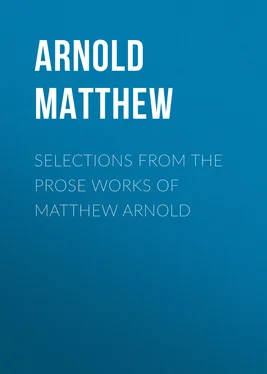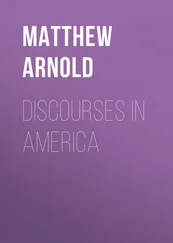Matthew Arnold - Selections from the Prose Works of Matthew Arnold
Здесь есть возможность читать онлайн «Matthew Arnold - Selections from the Prose Works of Matthew Arnold» — ознакомительный отрывок электронной книги совершенно бесплатно, а после прочтения отрывка купить полную версию. В некоторых случаях можно слушать аудио, скачать через торрент в формате fb2 и присутствует краткое содержание. Жанр: foreign_prose, literature_19, foreign_antique, на английском языке. Описание произведения, (предисловие) а так же отзывы посетителей доступны на портале библиотеки ЛибКат.
- Название:Selections from the Prose Works of Matthew Arnold
- Автор:
- Жанр:
- Год:неизвестен
- ISBN:нет данных
- Рейтинг книги:5 / 5. Голосов: 1
-
Избранное:Добавить в избранное
- Отзывы:
-
Ваша оценка:
- 100
- 1
- 2
- 3
- 4
- 5
Selections from the Prose Works of Matthew Arnold: краткое содержание, описание и аннотация
Предлагаем к чтению аннотацию, описание, краткое содержание или предисловие (зависит от того, что написал сам автор книги «Selections from the Prose Works of Matthew Arnold»). Если вы не нашли необходимую информацию о книге — напишите в комментариях, мы постараемся отыскать её.
Selections from the Prose Works of Matthew Arnold — читать онлайн ознакомительный отрывок
Ниже представлен текст книги, разбитый по страницам. Система сохранения места последней прочитанной страницы, позволяет с удобством читать онлайн бесплатно книгу «Selections from the Prose Works of Matthew Arnold», без необходимости каждый раз заново искать на чём Вы остановились. Поставьте закладку, и сможете в любой момент перейти на страницу, на которой закончили чтение.
Интервал:
Закладка:
Now this view I believe to be completely false. It is worth examining, inasmuch as it is a fair sample of a class of critical dicta everywhere current at the present day, having a philosophical form and air, but no real basis in fact; and which are calculated to vitiate the judgment of readers of poetry, while they exert, so far as they are adopted, a misleading influence on the practice of those who make it.
What are the eternal objects of poetry, among all nations and at all times? They are actions; human actions; possessing an inherent interest in themselves, and which are to be communicated in an interesting manner by the art of the poet. Vainly will the latter imagine that he has everything in his own power; that he can make an intrinsically inferior action equally delightful with a more excellent one by his treatment of it: he may indeed compel us to admire his skill, but his work will possess, within itself, an incurable defect.
The poet, then, has in the first place to select an excellent action; and what actions are the most excellent? Those, certainly, which most powerfully appeal to the great primary human affections: to those elementary feelings which subsist permanently in the race, and which are independent of time. These feelings are permanent and the same; that which interests them is permanent and the same also. The modernness or antiquity of an action, therefore, has nothing to do with its fitness for poetical representation; this depends upon its inherent qualities. To the elementary part of our nature, to our passions, that which is great and passionate is eternally interesting; and interesting solely in proportion to its greatness and to its passion. A great human action of a thousand years ago is more interesting to it than a smaller human action of to-day, even though upon the representation of this last the most consummate skill may have been expended, and though it has the advantage of appealing by its modern language, familiar manners, and contemporary allusions, to all our transient feelings and interests. These, however, have no right to demand of a poetical work that it shall satisfy them; their claims are to be directed elsewhere. Poetical works belong to the domain of our permanent passions: let them interest these, and the voice of all subordinate claims upon them is at once silenced.
Achilles, Prometheus, Clytemnestra, Dido 8 8 ~Dido~. See the Iliad , the Oresteia ( Agamemnon, Choëpharæ , and Eumenides ) of Æschylus, and the Æneid .
—what modern poem presents personages as interesting, even to us moderns, as these personages of an "exhausted past"? We have the domestic epic dealing with the details of modern life, which pass daily under our eyes; we have poems representing modern personages in contact with the problems of modern life, moral, intellectual, and social; these works have been produced by poets the most distinguished of their nation and time; yet I fearlessly assert that Hermann and Dorothea , Childe Harold , Jocelyn , the Excursion , 9 9 ~Hermann and Dorothea, Childe Harold, Jocelyn, the Excursion~. Long narrative poems by Goethe, Byron, Lamartine, and Wordsworth.
leave the reader cold in comparison with the effect produced upon him by the latter books of the Iliad , by the Oresteia , or by the episode of Dido. And why is this? Simply because in the three last-named cases the action is greater, the personages nobler, the situations more intense: and this is the true basis of the interest in a poetical work, and this alone.
It may be urged, however, that past actions may be interesting in themselves, but that they are not to be adopted by the modern poet, because it is impossible for him to have them clearly present to his own mind, and he cannot therefore feel them deeply, nor represent them forcibly. But this is not necessarily the case. The externals of a past action, indeed, he cannot know with the precision of a contemporary; but his business is with its essentials. The outward man of Oedipus 10 10 ~Oedipus~. See the Oedipus Tyrannus and Oedipus Coloneus of Sophocles.
or of Macbeth, the houses in which they lived, the ceremonies of their courts, he cannot accurately figure to himself; but neither do they essentially concern him. His business is with their inward man; with their feelings and behavior in certain tragic situations, which engage their passions as men; these have in them nothing local and casual; they are as accessible to the modern poet as to a contemporary.
The date of an action, then, signifies nothing: the action itself, its selection and construction, this is what is all-important. This the Greeks understood far more clearly than we do. The radical difference between their poetical theory and ours consists, as it appears to me, in this: that, with them, the poetical character of the action in itself, and the conduct of it, was the first consideration; with us, attention is fixed mainly on the value of the separate thoughts and images which occur in the treatment of an action. They regarded the whole; we regard the parts. With them, the action predominated over the expression of it; with us, the expression predominates over the action. Not that they failed in expression, or were inattentive to it; on the contrary, they are the highest models of expression, the unapproached masters of the grand style : 11 11 ~grand style~. Arnold, while admitting that the term ~grand~ style, which he repeatedly uses, is incapable of exact verbal definition, describes it most adequately in the essay On Translating Homer : "I think it will be found that the grand style arises in poetry when a noble nature, poetically gifted, treats with simplicity or with severity a serious subject." See On the Study of Celtic Literature and on Translating Homer , ed. 1895, pp. 264-69.
but their expression is so excellent because it is so admirably kept in its right degree of prominence; because it is so simple and so well subordinated; because it draws its force directly from the pregnancy of the matter which it conveys. For what reason was the Greek tragic poet confined to so limited a range of subjects? Because there are so few actions which unite in themselves, in the highest degree, the conditions of excellence; and it was not thought that on any but an excellent subject could an excellent poem be constructed. A few actions, therefore, eminently adapted for tragedy, maintained almost exclusive possession of the Greek tragic stage. Their significance appeared inexhaustible; they were as permanent problems, perpetually offered to the genius of every fresh poet. This too is the reason of what appears to us moderns a certain baldness of expression in Greek tragedy; of the triviality with which we often reproach the remarks of the chorus, where it takes part in the dialogue: that the action itself, the situation of Orestes, or Merope, or Alcmæon, 12 12 ~Orestes, or Merope, or Alcmæon~. The story of ~Orestes~ was dramatized by Æschylus, by Sophocles, and by Euripides. Merope was the subject of a lost tragedy by Euripides and of several modern plays, including one by Matthew Arnold himself. The story of ~Alcmæon~ was the subject of several tragedies which have not been preserved.
was to stand the central point of interest, unforgotten, absorbing, principal; that no accessories were for a moment to distract the spectator's attention from this, that the tone of the parts was to be perpetually kept down, in order not to impair the grandiose effect of the whole. The terrible old mythic story on which the drama was founded stood, before he entered the theatre, traced in its bare outlines upon the spectator's mind; it stood in his memory, as a group of statuary, faintly seen, at the end of a long and dark vista: then came the poet, embodying outlines, developing situations, not a word wasted, not a sentiment capriciously thrown in: stroke upon stroke, the drama proceeded: the light deepened upon the group; more and more it revealed itself to the riveted gaze of the spectator: until at last, when the final words were spoken, it stood before him in broad sunlight, a model of immortal beauty. This was what a Greek critic demanded; this was what a Greek poet endeavored to effect. It signified nothing to what time an action belonged. We do not find that the Persæ occupied a particularly high rank among the dramas of Æschylus because it represented a matter of contemporary interest: this was not what a cultivated Athenian required. He required that the permanent elements of his nature should be moved; and dramas of which the action, though taken from a long-distant mythic time, yet was calculated to accomplish this in a higher degree than that of the Persæ , stood higher in his estimation accordingly. The Greeks felt, no doubt, with their exquisite sagacity of taste, that an action of present times was too near them, too much mixed up with what was accidental and passing, to form a sufficiently grand, detached, and self-subsistent object for a tragic poem. Such objects belonged to the domain of the comic poet, and of the lighter kinds of poetry. For the more serious kinds, for pragmatic poetry, to use an excellent expression of Polybius, 13 13 ~Polybius~. A Greek historian (c. 204-122 B.C.)
they were more difficult and severe in the range of subjects which they permitted. Their theory and practice alike, the admirable treatise of Aristotle, and the unrivalled works of their poets, exclaim with a thousand tongues—"All depends upon the subject; choose a fitting action, penetrate yourself with the feeling of its situations; this done, everything else will follow."
Интервал:
Закладка:
Похожие книги на «Selections from the Prose Works of Matthew Arnold»
Представляем Вашему вниманию похожие книги на «Selections from the Prose Works of Matthew Arnold» списком для выбора. Мы отобрали схожую по названию и смыслу литературу в надежде предоставить читателям больше вариантов отыскать новые, интересные, ещё непрочитанные произведения.
Обсуждение, отзывы о книге «Selections from the Prose Works of Matthew Arnold» и просто собственные мнения читателей. Оставьте ваши комментарии, напишите, что Вы думаете о произведении, его смысле или главных героях. Укажите что конкретно понравилось, а что нет, и почему Вы так считаете.












